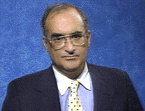|
|
|
|


|
WHOM THE BELLS TOLL
APRIL 2, 1996
TRANSCRIPT |
|---|---|
 PAUL SOLMAN: Yesterday was a big one for the telecommunications industry. SBC Corporation, formerly Southwestern Bell,
announced it was buying Pacific Telesis for
almost $17 billion in less than one fell swoop became the second largest phone
company in the nation. The new company says it will more efficiently provide
telephone services to better than 30 million customers in the Southwest and the
Far West and wires, that is, cellular phone service nationwide. But critics fear
that when two Baby Bells get together, you get a Big Brother Bell. With us to
explain and debate the consequences of the changing phone business are Howard
Anderson of the Yankee
PAUL SOLMAN: Yesterday was a big one for the telecommunications industry. SBC Corporation, formerly Southwestern Bell,
announced it was buying Pacific Telesis for
almost $17 billion in less than one fell swoop became the second largest phone
company in the nation. The new company says it will more efficiently provide
telephone services to better than 30 million customers in the Southwest and the
Far West and wires, that is, cellular phone service nationwide. But critics fear
that when two Baby Bells get together, you get a Big Brother Bell. With us to
explain and debate the consequences of the changing phone business are Howard
Anderson of the Yankee  Group, a communications analysis company here in Boston, and Bradley
Stillman of the Consumer Federation of America in Washington. Gentlemen, welcome
to you both. Now, Mr. Anderson, this is basically the old local California and
Nevada phone companies buying up the old Southwestern company of Texas,
Oklahoma, Kansas, and so forth. Why did they do it?
Group, a communications analysis company here in Boston, and Bradley
Stillman of the Consumer Federation of America in Washington. Gentlemen, welcome
to you both. Now, Mr. Anderson, this is basically the old local California and
Nevada phone companies buying up the old Southwestern company of Texas,
Oklahoma, Kansas, and so forth. Why did they do it?
HOWARD ANDERSON, The Yankee Group: (Boston) You got it just backwards. It was the Southwestern company who bought the other.
PAUL SOLMAN: Sorry.
MR. ANDERSON: They did it for a few reasons. One, you can expect telephone
companies to start pairing up like animals going up Noah's Ark two by two. The
second reason--
PAUL SOLMAN: Why?
MR. ANDERSON: Mainly for efficiencies. There is enormous cost savings to be taken out by having two companies take some of those operations and make it one.
PAUL SOLMAN: What's an example of this?
MR. ANDERSON: The computing billing system, for example, writing specialized software. Why will two companies do it when one can do it, and both can share it?
 PAUL SOLMAN: Okay. So they consolidate the operations, they lose some jobs, and
it's more efficient, more productive.
PAUL SOLMAN: Okay. So they consolidate the operations, they lose some jobs, and
it's more efficient, more productive.
MR. ANDERSON: Very much like banks, yes.
PAUL SOLMAN: Okay. So that's one. What's the other reason?
MR. ANDERSON: The second reason you're going to see these kinds of mergers is because all these little telephone companies are going to be in the long distance business and the wireless business, so they can sell their own brand of long distance in their serving area, so they have those efficiencies also.
PAUL SOLMAN: Let's clarify this. Mr. Stillman, who are these Baby Bells that we're talking about so that we at least get some background on who we're talking about?
 BRADLEY STILLMAN, Consumer Federation of America: Well, these seven countries
were created after AT&T was broken up as a result of an antitrust suit
brought against the old Ma Bell. The concern was that Ma Bell is preventing
consumers from using equipment that they could purchase for much lower prices
than AT&T was selling. They weren't getting the benefits of competition for
the long distance industry, and as a result, the government stepped in and
created these seven regional holding companies that were engaged primarily in
the business of local phone service.
BRADLEY STILLMAN, Consumer Federation of America: Well, these seven countries
were created after AT&T was broken up as a result of an antitrust suit
brought against the old Ma Bell. The concern was that Ma Bell is preventing
consumers from using equipment that they could purchase for much lower prices
than AT&T was selling. They weren't getting the benefits of competition for
the long distance industry, and as a result, the government stepped in and
created these seven regional holding companies that were engaged primarily in
the business of local phone service.
PAUL SOLMAN: And these are two of the seven?
MR. STILLMAN: Exactly.
PAUL SOLMAN: And there's AT&T as well. Is this connected to the recent passage of the telecommunications bill, this particular--it is the first of the mergers of these companies, isn't it?
MR. STILLMAN: Well, I would argue that it is in a way. Now, there was nothing that prohibited these companies from trying to get together before the bill was passed, but I think the reality is if they went into court and tried to tell Judge Green, who was then overseeing the telecommunications industry, that they wanted to get back together, there was no chance that he would allow that to happen. So I do think it's an outgrowth of the passage of the law.
PAUL SOLMAN: Okay. Mr. Anderson, is this a big deal? I mean, for the Pacific
Telesis shareholders I guess it's a big deal, I guess if you had a phone in
California or Texas. But for the rest of us, is it--is it somehow momentous or
meaningful?
MR. ANDERSON: Tempest and teapot. The users in California will be very little affected by this. They will still have the Pactel brands. The users in Texas will be little affected by it. You will see, however, Pactel getting into wireless. They had a wireless division.
PAUL SOLMAN: Pactel is the Pacific Telesis--
MR. ANDERSON: That's the California one. They had a wireless division now called Air Touch, which was spun off two years ago.
PAUL SOLMAN: They'll be back. Well, they have been buying wireless already, or have they not?
MR. ANDERSON: No, they haven't.
PAUL SOLMAN: Southwestern Bell has been buying--
MR. ANDERSON: Southwestern was an early and vigorous entrant into the wireless--
PAUL SOLMAN: Mr. Stillman, tempest and a teapot?
 MR. STILLMAN: Well, no, I think it's much bigger than that. I think there's at
least two major concerns for consumers in the market served by these companies.
First, the merger of these two companies making a massive economic power house
makes it less likely that somebody's going to decide to go in and compete
anytime soon. As a result, consumers end up with telephone bills that are higher
than they would be in a competitive market for a much longer time. The second
concern, I think, is particularly for the people in California, you're talking
about a merger of two companies who have very different corporate philosophies,
very different relationships with the states, with the consumers in their
states, and I think that the people in California may be in for a shock because
Pacific Tel has a history of being fairly progressive on issues like Lifeline
service, which is for low-income consumers, and consumer education, and I think
that Southwestern Bell, now known as SBC Communications, is much, much more
difficult to deal with.
MR. STILLMAN: Well, no, I think it's much bigger than that. I think there's at
least two major concerns for consumers in the market served by these companies.
First, the merger of these two companies making a massive economic power house
makes it less likely that somebody's going to decide to go in and compete
anytime soon. As a result, consumers end up with telephone bills that are higher
than they would be in a competitive market for a much longer time. The second
concern, I think, is particularly for the people in California, you're talking
about a merger of two companies who have very different corporate philosophies,
very different relationships with the states, with the consumers in their
states, and I think that the people in California may be in for a shock because
Pacific Tel has a history of being fairly progressive on issues like Lifeline
service, which is for low-income consumers, and consumer education, and I think
that Southwestern Bell, now known as SBC Communications, is much, much more
difficult to deal with.
PAUL SOLMAN: Well, then let's take these two, Mr. Anderson. First of all, for our many Californian viewers, do they really have something to worry about, or is Mr. Stillman--they should be concerned about?
 MR. ANDERSON: These two companies--California is a high-tech areas so subject
like internet become very important. Lifeline telephone--
MR. ANDERSON: These two companies--California is a high-tech areas so subject
like internet become very important. Lifeline telephone--
PAUL SOLMAN: Access to the internet on the phone line.
MR. ANDERSON: Access to internet, but they are all ex-Bell employees who are running these groups. They are more alike than different.
PAUL SOLMAN: Okay. What about this issue that we've heard a lot about, which
is too much power? I mean, the telecommunications bill supposedly is creating
more--yet here, we have consolidation, less competition--that what Mr. Stillman
says.
MR. ANDERSON: You're going to have an oligopoly.
PAUL SOLMAN: What's an oligopoly?
MR. ANDERSON: Oligopoly is competing by a notable but not a infinite number of participants.
PAUL SOLMAN: Two big players dominating the market.
MR. ANDERSON: Eleven companies offering long distance service in most major markets: AT&T, MCI, Sprint. You'll have each of the seven, now six regional Bell companies, plus companies like LCI, LDDS, and whatever.
PAUL SOLMAN: Whatever else.
MR. ANDERSON: These are other, No. 4, No. 5 long distance companies. So having nine, not ten or ten, not eleven, doesn't seem to me to be contracting competition.
PAUL SOLMAN: So Mr. Stillman, I read somewhere that you said six companies is enough to make a market, a competitive market. He's got 11 here, so are we okay?
 MR. STILLMAN: Well, an economist would say that you need six to ten equal size
competitors to have a vigorous competitive market. The problem with getting to
competition is that the last vestige of the old Bell monopoly was at the local
level. That is not going to change anytime soon. AT&T and MCI and Sprint,
and all of the other competitive companies still have to go through your local
monopoly phone company to reach you, to reach every customer. And until that
changes, that allows the monopoly to remain the gatekeeper. They get to control
competition.
MR. STILLMAN: Well, an economist would say that you need six to ten equal size
competitors to have a vigorous competitive market. The problem with getting to
competition is that the last vestige of the old Bell monopoly was at the local
level. That is not going to change anytime soon. AT&T and MCI and Sprint,
and all of the other competitive companies still have to go through your local
monopoly phone company to reach you, to reach every customer. And until that
changes, that allows the monopoly to remain the gatekeeper. They get to control
competition.
PAUL SOLMAN: You're shaking your head, Mr. Anderson.
MR. ANDERSON: No. We will have local competition by every cable company in North America.
PAUL SOLMAN: Cable companies coming in, challenging the phone companies.
 MR. ANDERSON: Giving you telephone service through your cable system we will
have local competition from your AT&T companies. We will have local
competition from MCI and Sprint. The place of long distance--
MR. ANDERSON: Giving you telephone service through your cable system we will
have local competition from your AT&T companies. We will have local
competition from MCI and Sprint. The place of long distance--
PAUL SOLMAN: How--how will we have local competition from them--this wireless stuff?
MR. ANDERSON: You will see it. Wireless is a very effective competitor to local--and you're seeing it that way also.
PAUL SOLMAN: So you're going to--so plenty of competition, so Mr. Stillman, if there's going to be--we're seeing wireless, there's this first PCS, Personal Communication--
MR. STILLMAN: --actual competition in virtually any market across the country if you're a residential rate payer for telephone service. That is not going to change overnight. And so long as the so-called "competitors" have to rely on the monopoly to reach their customers, you're never going to get vigorous competition. It's sort of like asking a company to compete with their own distributor. It just doesn't lead to vigorous price competition.
 PAUL SOLMAN: Mr. Anderson, do you think that we're going to get more and more
consolidation? I mean, is it possible that the old AT&T, having been torn
apart by federal decree, is now going to be put back together, not AT&T
specifically, but that one company could wind up again dominating the way
AT&T of old did, because there are all these efficiencies you were talking
about earlier?
PAUL SOLMAN: Mr. Anderson, do you think that we're going to get more and more
consolidation? I mean, is it possible that the old AT&T, having been torn
apart by federal decree, is now going to be put back together, not AT&T
specifically, but that one company could wind up again dominating the way
AT&T of old did, because there are all these efficiencies you were talking
about earlier?
MR. ANDERSON: No. I think the answer is that you may see a few mergers and most of these mergers don't always work out as well. You will never see the seven put back together again. The Department of Justice and Ann Bingham won't allow it, and I don't think the country would allow it.
PAUL SOLMAN: So this is something--you're not worried about that, I take it?
MR. ANDERSON: Well--
PAUL SOLMAN: There will only be one company--
MR. ANDERSON: I'm more worried about there being only one major company in each major market, so that if you have six big companies but they're all competing or not competing in their own discreet areas, you don't have the benefit of competition for consumers. And as a result, their rates remain far too high.
PAUL SOLMAN: Is it--is the only thing you worry about the price here, or do you worry about the issue of sort of power for its own sake?
MR. ANDERSON: No. The, the backdrop to all of these mergers, whether you're talking about Disney, ABC, or the phone companies, is who's going to have access to the home, who's going to control our access to information. That company that decides what comes and goes to and from your house is going to have immense power in the information age, and we have to make sure that we don't concentrate that in too few hands.
PAUL SOLMAN: A very short last response to that. You don't worry about some company having too much power to give us our information and withhold it from us?
 MR. STILLMAN: In some cases, the wired system is already obsolete.
We're going to have a half dozen wireless options, and that will bring us
competition.
MR. STILLMAN: In some cases, the wired system is already obsolete.
We're going to have a half dozen wireless options, and that will bring us
competition.
PAUL SOLMAN: Okay. Well, thank you both very much. I appreciate it.
|